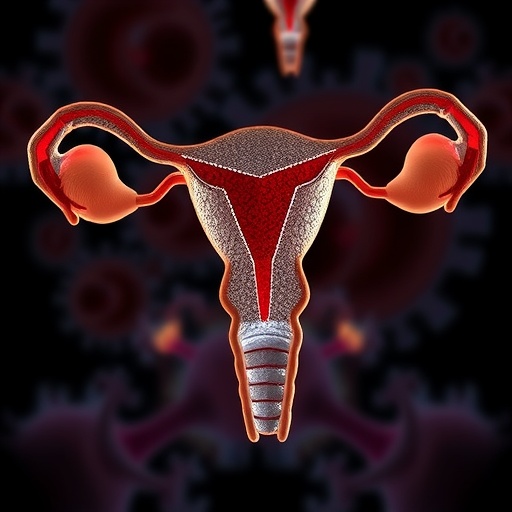In recent years, the quest to restore ovarian function in women facing primary ovarian failure (POF) has gained significant attention in the realm of reproductive health research. A groundbreaking study by Yimamuyushan et al. sheds light on innovative strategies involving mesenchymal stem cells (MSCs) and their potential role in addressing this challenging condition. The research investigates how pigmented epithelium-derived factor (PEDF)-expressing MSCs can intervene in the immune system’s behavior, specifically through a pathway involving the Tim-3 protein, thereby rejuvenating ovarian function.
Primary ovarian failure is characterized by the loss of normal ovarian function before the age of 40, resulting in infertility and a host of secondary symptoms related to estrogen deficiency, including hot flashes, mood fluctuations, and reduced bone density. Conventional treatments have offered limited success, often falling short in effectively restoring fertility or alleviating the accompanying symptoms. This creates a compelling need for innovative, effective therapies that can not only restore ovarian functionality but also improve the overall quality of life for affected women.
At the core of this study is the concept that the immune system plays a vital role in ovarian function. It has long been established that an imbalance in immune responses can contribute to ovarian degeneration. Yimamuyushan and colleagues propose that by modulating this immune response, specifically through the Tim-3 pathway, it may be possible to promote a regenerative environment conducive to ovarian recovery. Tim-3 is a protein involved in immune regulation, primarily through its role in the suppression of T-cell responses. By harnessing this mechanism, researchers aim to create a therapeutic approach that encourages ovarian tissue restoration.
The researchers focused on the application of PEDF-expressing MSCs, a unique type of stem cell known for their regenerative properties and ability to modulate the immune environment. PEDF, a potent anti-inflammatory factor, is thought to help create an ideal milieu for healing and regeneration by inhibiting inflammatory processes that can lead to tissue damage. By infusing these specialized MSCs into models of primary ovarian failure, the study seeks to understand how they can not only halt ovarian decline but also promote the regrowth of ovarian follicles.
The experimental design of this study involved both in vitro and in vivo analysis. Initial laboratory tests evaluated the interaction of PEDF-expressing MSCs with ovarian cells, assessing how these stem cells would behave in an environment mimicking primary ovarian failure. The researchers identified significant changes in immune cell profiles post-treatment, indicating that these MSCs could effectively modulate immune activity in a favorable direction, leading to improved ovarian health.
Following these preliminary findings, the in vivo component of the study provided critical insights into the overall effectiveness of the therapy. Animal models were utilized to assess fertility outcomes and ovarian function restoration after administration of PEDF-expressing MSCs. Remarkably, results indicated that treated subjects exhibited not only recovered ovarian function but also a noticeable enhancement in hormone levels, critical to reproductive health.
In addition to hormonal restoration, the researchers documented an increase in the number of healthy ovarian follicles in treated animals, which bodes well for future fertility prospects. This achievement holds promise, particularly for women with POF who have been deprived of a natural avenue for conception due to inadequate ovarian function. The data highlighted an explicit connection between the administration of PEDF-expressing MSCs and the revitalization of ovarian architecture, showcasing a previously unrecognized capability for tissue regeneration facilitated by immune modulation.
Notably, the researchers emphasized that the therapeutic potential of these findings extends beyond mere fertility restoration. Improved ovarian health can lead to a reduction in the systemic health risks associated with estrogen deficiency, such as osteoporosis and cardiovascular diseases, thus enhancing overall well-being. It reflects a broader trend in medical research that aims to address root causes rather than just symptoms, advocating for a holistic approach to treatment.
The implications of Yimamuyushan et al.’s work stretch into the future, raising questions about the scalability and applicability of MSC therapies in clinical practice. The forthcoming challenges will involve translating these promising preclinical results into human trials while addressing issues related to the safety and efficacy of such treatments. Regulatory approvals, logistical considerations, and public perception of stem cell therapies remain vital components that will shape the future of this burgeoning field.
As the study of PEDF-expressing MSCs progresses, it reinforces the importance of interdisciplinary collaboration in biomedical research. The convergence of immunology, reproductive health, and regenerative medicine has opened up a new avenue for scientific exploration that could redefine the therapeutic landscape for primary ovarian failure.
In conclusion, the research spearheaded by Yimamuyushan et al. marks a significant stride toward addressing the complex challenges posed by primary ovarian failure. The innovative use of PEDF-expressing MSCs to modulate immune responses not only represents a novel therapeutic mechanism but also indicates a hopeful future for affected individuals seeking effective solutions. As researchers delve deeper into the cellular mechanisms at play, the dream of restoring fertility and improving quality of life for women with POF may one day transition from laboratory benches to clinical practice, heralding a new era in reproductive medicine.
Subject of Research: Primary Ovarian Failure and Immunotherapy using PEDF-expressing Mesenchymal Stem Cells
Article Title: PEDF-Expressing mesenchymal stem cells restore ovarian function via Tim-3-Mediated immune modulation in primary ovarian failure.
Article References: Yimamuyushan, S., Shi, S., Muheremu, A. et al. PEDF-Expressing mesenchymal stem cells restore ovarian function via Tim-3-Mediated immune modulation in primary ovarian failure. J Ovarian Res 18, 182 (2025). https://doi.org/10.1186/s13048-025-01778-0
Image Credits: AI Generated
DOI: 10.1186/s13048-025-01778-0
Keywords: Ovarian Failure, Mesenchymal Stem Cells, Immune Modulation, PEDF, Tim-3, Regenerative Medicine, Fertility Restoration, Women’s Health




